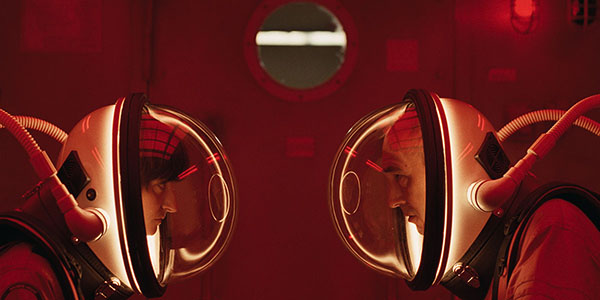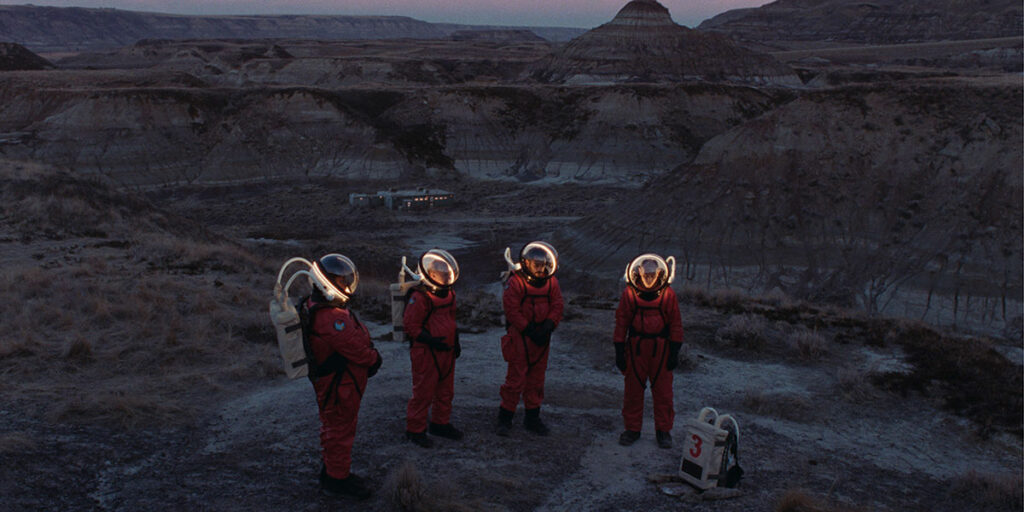Through its ambiguous and cold nature, Viking is a character study that constantly has you asking, “Who are the real characters we’re studying?”
Viking is an upcoming science-fiction drama directed and co-written by Stéphane Lafleur. It stars Steve Laplante as David, a physical education teacher who has dreams of becoming an astronaut. Though the first manned mission to Mars has already taken off, the astronauts on that mission are facing interpersonal problems. As such, David is recruited by the Viking Society to take part in a simulated version of the Mars mission, as part of a group of five subjects chosen for their similarities to the real-life astronauts. Joined by a woman who takes on the role of “Steven” (Larissa Corriveau), and the supervisor of the quintet, “Janet” (Fabiola N. Aladin), he hopes to help remedy the problems faced by the real astronauts, with the dangling possibility of subsequently becoming one himself.
The biggest source of intrigue that Viking has revolves around the duality between this crew’s personas that they’re inhabiting and their actual personalities. They were selected specifically for their similarities to the actual astronauts in space, and they’re constantly being told that they need to keep their behaviors and choices as close to those of their counterparts as possible, right down to certain biological functions. As a result, every time someone makes a certain call or develops a certain dynamic with another character, you wonder if these same choices or relationships are unfolding the same way with the astronauts. But even more fascinating and even a bit off-putting are the questions of whether what you’re seeing unfold with our cast is only happening because they’re supposed to be mirroring and fitting into roles outside of themselves, and if things would play out differently had they had total agency over themselves.
“Steven” seems to be the one character who sees through the problems with this experiment from the start. At first it seems like she’s just more relaxed or maybe even uncaring about the “authenticity” of her character, but there’s ultimately a reveal about the actual Steven that, in hindsight, makes the idea of her embodying that persona so much more unsettling. I’m wondering if she began picking up on what she’d have to put herself through in order to really embody that person and if that played a huge part in her increasing disillusionment with the whole thing. If she did commit to what was necessary, would the powers that be go along with it? A certain choice they make for David in showing him a certain video in the middle of the film definitely exposes the low places they’ll go to make this simulation as thorough as possible. This is made dangerous to David, who becomes more committed to the experiment thanks to the promise of potentially being an astronaut himself. It even begins to mess with his mind, which comes to a head in what is by far the most concerning scene in Viking.

Viking as a whole, from how I interpret it, seems to come out with a rather negative outlook on the process of space exploration as a whole, or at the very least how it’s handled. Obviously, this is a scenario that (to my knowledge at least) has never really happened, to a point where the obvious impracticality of the project is something I consider to be an issue with the film. I just don’t see how anyone would benefit from this to a degree that justifies how much the “test” astronauts go through. But still, Lafleur is using Viking to show a man – David – with starry-eyed dreams of traveling into space, that are slowly torn apart by the reality of how people like him are treated and what they’re forced to go through. A reveal at the end regarding his place in the entire program really seems to drive this point home, and the exasperation in David is made very clear, particularly through excellent physical acting on the part of Steve Laplante.
Everyone’s performance is strong, in fact. Every actor brings an extra dimension to their characters and, more importantly, they support the ambiguity of what choices are “theirs” and what choices are that of their space-bound counterparts. Fabiola N. Aladin’s portrayal of “Janet” sticks out the most to me in this regard because of her position at the start of the mission. Every time I think that we’re simply seeing her own stricter, more disciplined personality taking charge, I remind myself that she may just be playing the role of the real Janet. When that happens, I look at her disapproval towards those who defy her and wonder if she’s fed up with everyone not listening to her, or with being forced to be in a spot where she has to conflict with them at all. She was chosen because she’s a lot like the real Janet, but is she similar to that degree? I can’t stress enough that these kinds of questions are what make Viking stand out the most. It’s a really interesting character examination that constantly has you asking, “Who are the real characters we’re examining?”
Even the way Viking looks elicits that cold, unfeeling nature of the program. There are a lot of shots with dull, colorless negative space that frame characters as just parts of the scenery, and very little cinematic flair is given to the blocking at all. This generally works to sell that feel, to a point where I occasionally forgot that these characters aren’t actually in space. That’s very impressive. Though I don’t think it works as well during the more emotional, intensely uncomfortable sequences. I noticed this most when watching David’s reaction to an aforementioned video, where his extreme reaction didn’t hit as hard as I think it could have because of how standardly it’s shot. But I again do like how Viking looks overall, and Sara Mishara’s cinematography works especially well with the colors and lighting that come across as both bleak and dreamlike at the same time. There’s a bit of a hypnotic quality to several shots in Viking, which helps it visually keep your attention even if the majority is shot about as typically as you can get.
I’m not sure that Viking ’s grasp manages to match its reach. Some logistics regarding the motivation behind the experiment don’t fully mesh for me, and for how much the film thrives on its ambiguity, I believe it could have played around with us even more to really mess with our heads. But then again, something about how downplayed the psychologies are strangely adds a bit to the film’s eeriness. Maybe some middle ground could have been met, but it’s hard to complain too much when, in the end, I was slowly but surely drawn into these characters and the increasingly off-putting scenario they’re in.
In a world where countless films centered around space travel exist, Viking takes the kind of approach that I can’t really recall having seen before. It resembles a lot of other films, but it combines disparate elements to make something that feels really fresh when lumping it in with those other films. It’s definitely not what many might expect going in, but it has a lot of subtly surprising developments and beats that have been staying with me ever since I finished the film. Anyone who likes this kind of subject matter should definitely check out Viking when or if they can. It’s not one of the best films of the year, but it’s certainly one of the more interesting ones to think about.
Viking premiered at TIFF on September 12, 2022. Read our interview with director Stéphane Lafleur.

